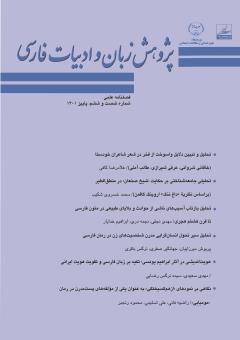هویتاندیشی در آثار ابراهیم یونسی؛ تکیه بر زبان فارسی و تقویت هویت ایرانی
محورهای موضوعی : پژوهشهای ادبیات کلاسیک ایرانمهدی سعیدی 1 , سیده نرگس رضایی 2
1 - Assistant professor of Persian language and literature, Institute for Humanities and Social Studies (IHSS).
2 - استادیار گروه زبان و ادبیات فارسی، دانشگاه پیام نور، تهران، ایران
کلید واژه: ابراهیم یونسی, هویت ایرانی, هویت قومی, زبان فارسی, زبان کردی.,
چکیده مقاله :
در ایران معاصر، گاهی رابطۀ میان هویتهای قومی و هویت ایرانی در مرز میان همسویی، تضاد، تنازع و گسست بوده است. روایتهای سیاسی و اجتماعی از مسئله هویت ایرانی و عناصر آن، در تضعیف یا تقویت این رابطه اثرگذار است. از سه روایت ملتگرا، مدرن و پست مدرن و تاریخی، تنها روایت تاریخی است که با پرهیز از افراط و تفریط در تبیین مسئله، به تحکیم و پیوستگی حداکثری ایران و ایرانیان توجه دارد. ابراهیم یونسی، فعال سیاسی، مترجم و نویسنده کردتبار ایرانی، صاحب آثار متعددی به زبان فارسی است. برخی از آنچه او ترجمه کرده دربارۀ تاریخ فرهنگی و سیاسی کردها و وقایع سیاسی معاصر است. همچنین از او رمانهایی نیز با زمینۀ اقلیمی منتشر شده است. او در مقدمه یا پاورقی اغلب ترجمهها به نسبت میان کردها و ایران توجه دارد و به گونهای هویتاندیشانه میان کردها و ایران رابطهای همسو و همجهت برقرار میکند و نظر نویسندگانی را که قائل به تمایز و جدایی میان هویت قومی و هویت ایرانی هستند یا بخشی از عناصر هویت قومی را در جهت تضعیف هویت ایرانی برجسته کردهاند، نقد میکند. او به ویژه متوجه نقش و کارکرد هویتساز زبان کردی و زبان فارسی است. بنابراین، به رغم وابستگی سیاسیِ ابتدایی خود یا خلاف آنچه برخی احزاب سیاسی در نظر دارند، میان زبان کردی و زبان فارسی قائل به رابطهای همسو است. از اینرو زبان فارسی را برای نوشتن به کار میگیرد و سعی میکند با کاربست فراوان واژگان و آنچه داشتههای دانشی و زبانی کردی است، بر غنای زبان فارسی و گنجینۀ لغوی و فرهنگی آن در آثارش بیفزاید. در این مقاله با تحلیل مقدمههای ترجمهها و توجه به مسائل زبانی داستانها به این وجه هویتاندیشانۀ ابراهیم یونسی پرداخته شده است.
identities and Iranian identity has been on the border between alignment, contradiction, conflict and rupture. Political and social narratives of the issue of Iranian identity and its elements are effective in weakening or strengthening this relationship. Among the three nationalistic, modern, postmodern and historical narratives, it is the only historical narrative that pays attention to the maximum consolidation and unity of Iran and Iranians by avoiding excess and exaggeration in explaining the problem. Ebrahim Yunsi, a political activist, translator and writer of Iranian Kurdish descent, is the author of several works in Persian. Some of what he translated is about Kurdish cultural and political history and contemporary political events. In the introduction or footnote of most of the translations, he pays attention to the relationship between Kurds and Iran, and in a way of Focusing on identity between Kurds and Iran, he establishes an aligned and consistent relationship. Also, in his works, he criticizes the opinion of writers who have highlighted some of the elements of ethnic identity in order to weaken Iranian identity, or who believe in the distinction and separation between ethnic identity and Iranian identity. He is especially aware of the role and function of the Kurdish language and the Persian language. Therefore, in spite of his primary political affiliation or contrary to what some political parties think, he believes that there is an equal relationship between the Kurdish language and the Persian language. Therefore, he uses the Persian language to write and tries to increase the richness of the Persian language and its lexical and cultural treasure in his works by using a lot of words and what is Kurdish knowledge and language. In this article, by analyzing the introductions of the translations and paying attention to the linguistic issues of the stories, this aspect of the identity in opinion of Ebrahim Yunsi has been discussed.
